Guide to Helping Your Dog’s Upset Stomach
Just like humans, dogs aren’t always going to be perfectly healthy. They have to deal with upset stomachs from time to time, just like we do. Mild stomach problems are usually treatable at home with some simple care strategies and natural remedies. However, more serious symptoms may require a trip to the vet to diagnose and treat your dog’s upset stomach.
Bully Max offers this guide to help you understand the signs and causes of stomach upset, plus the best remedies for your dog’s health issues.
Common Causes of an Upset Stomach
According to veterinarians, it’s completely normal for dogs to experience mild digestive problems every so often. The top reason is that dogs are curious animals who often eat something they shouldn’t while playing or exploring. When they ingest something that’s bad for them, retching and diarrhea are often quick to follow. These are natural and protective processes a dog’s body uses to expel things that shouldn’t be in their bodies. Other common causes of an upset stomach include:
- Bacterial infections or imbalance
- Changes in diet
- Chronic health condition
- Food allergy or sensitivity
- Medication
- Old age
- Parasites
- Spoiled food
- Stress
Sometimes, you might be able to figure out what’s causing your dog’s digestive issues, while other times, it’s a bit of a mystery. Learning to recognize the signs of your dog’s upset stomach can help you determine how best to help your dog, whether it’s with at-home remedies or seeking professional help from a veterinarian.
Signs of a Dog’s Upset Stomach

Experienced dog owners may already know how to recognize their dog’s gastrointestinal issues; however, new pet owners may not realize what their dog’s symptoms mean. The following behaviors may indicate that something is wrong within your dog’s digestive tract:
- Acting uncomfortable or pacing
- Depression
- Diarrhea
- Distended stomach/bloating
- Drinking less water or no water
- Eating grass
- Eating less
- Extensive drooling
- Frequent stretching
- Gulping to combat reflux
- Gurgling stomach noises
- Licking the floor, their lips, the air, or objects
- Loss of appetite
- Passing gas
- Unusual fatigue
- Vomiting
It’s time to address your dog’s health if they aren’t acting like their usual selves and are exhibiting any of these symptoms. Sick dogs can have one or more signs of an upset stomach, and the intensity of their symptoms varies depending on different factors, such as their age and the cause of the upset. Some easy home remedies may ease their pain, or a checkup at the vet might be required. Let’s get into how to tell which type of care is best for your pet’s situation.
When to Try Home Remedies
If your dog is showing mild signs of an upset stomach, you can try caring for them at home before heading to the vet. Withholding food allows your pet to fast for 12 to 24 hours. Smaller dogs should only fast for a maximum of 12 hours. Fasting gives your pet’s digestive system time to work through what’s causing the upset. Slowly reintroduce your dog’s regular food after the fast to see if they can digest it normally.
Bland Diet Foods
If they still have a mild stomach upset, try a bland diet instead. Cooked white rice and boiled chicken are plain foods that are easier for a sensitive stomach to digest. The meat should be both boneless and skinless and only make up about 25% of the meal compared to the rice. The bland diet should be given as three to four smaller meals throughout the day.
Soothing Natural Foods
Pumpkin is another natural food that eases stomach discomfort and diarrhea. Be sure to buy plain, pureed pumpkin with no additives and not canned pumpkin pie filling. Pumpkin’s high soluble fiber content will coat and soothe your dog’s digestive tract and their irritable bowels. It’s also an excellent source of potassium for a sick dog dealing with dehydration.
Pureed sweet potatoes are a good option, as well. They can typically be found in the baby food aisle at the grocery store. A spoonful of plain yogurt or cottage cheese can also be added into a bland diet to help soothe an upset tummy and encourage eating.
Alternative Hydration Methods

When your dog is having trouble keeping down water, it’s important to try different hydration methods to avoid dehydration. If it’s been a while since they’ve had a drink or vomited, first try slowly offering crushed ice cubes every two to three hours. Once they keep the ice chips down, you can begin offering small amounts of water. If their body doesn’t reject it, keep offering more water over time until they’re back to their usual drinking habits.
Dehydration is dangerous for dogs, especially in smaller breeds and puppies. To encourage drinking, you can add sodium-free chicken bone broth to their water. Your vet may also recommend a 50-50 combination of water and a drink like Pedialyte to help keep their electrolytes balanced.
A few tests can be done to determine if your home remedies are working or if your dog is dehydrated. First, try a skin elasticity test by pulling gently on your pet’s skin and then letting go. It should bounce right back into place. You can also check the condition of your dog’s gums. A healthy and hydrated dog should have moist and slippery gums, not dry and sticky. Their saliva should be clear and thin, not thick and pasty, and their nose should be wet.
When to Go to the Vet
Call your vet if your pet is exhibiting signs of dehydration. Your dog may need IV fluids and expert care to aid in their recovery. In addition, you should probably contact a vet if your pet’s mild symptoms don’t subside after 12 to 24 hours. Other serious signs that your pet needs professional or emergency medical care include the following:
- Constipation
- Weight loss
- Signs of increased discomfort
- Increase of vomiting and/or diarrhea
- Blood in vomit or stools
- Foreign objects in vomit and/or poop
- Collapse
- Weakness
- No energy
- No appetite after 24 hours
- Dehydration
Certain foods, plants, and household products are toxic for dogs. If you know your dog ingested something they shouldn’t have, reach out to your vet, local emergency animal hospital, or the ASPCA Animal Poison Control Center. They will help you determine if it’s life-threatening and requires emergency medical care or if it’s treatable at home.
When to Use Probiotics and Prebiotics
Studies show that probiotics and prebiotics supplements for dogs work together to aid their digestion processes and boost their immune systems. Prebiotics are types of natural fiber found in high-fiber foods that support the probiotics, or good bacteria, in a dog’s colon. These natural supplements also help inhibit the growth of bad bacteria while increasing the number of good bacteria in the gut. Probiotics may also help to:
- Treat diarrhea
- Relieve irritable bowel
- Reduce intestinal inflammation
- Prevent urinary infections
- Reduce allergic reactions
Probiotics are a healthy addition to your dog’s diet, especially after recovering from an upset stomach. Illness, stress, and other issues cause microbial imbalances in dogs. Probiotic and prebiotic supplements help restore balance. They are available over-the-counter and can even be found in some high-quality dog foods.
Improve Your Dog’s Health With Bully Max Dog Food and Supplements
Dealing with a dog’s upset stomach can be difficult, especially if you don’t know what’s causing their symptoms. Simple home remedies, like a bland diet and ice chips, can help your pup recover from a mild stomach issue. More serious problems will require timely help and expert care from a veterinarian. Your dog’s wellness is as important to us here at Bully Max as it is to you and the professionals who help care for them.
From adult dogs to puppies 4 weeks and older, Bully Max’s dog food is a safe and healthy choice for all ages and breeds. Most dog foods are plant-based, with ingredients that aren’t good for dogs. Corn, wheat, and soy proteins can trigger allergic reactions and cause digestive issues. Bully Max’s High-Performance Dog Food is an all-natural, meat-based formula. It doesn’t contain any harmful artificial flavors, colors, preservatives or hidden ingredients.
Bully Max’s products also support healthy bones, joints, skin, and coat, and we promise there are no cheap fillers or negative side effects. Our 100% natural ingredients won’t change your dog’s mood or behavior. We never use creatine or steroids in our products. So, if your dog requires extra nutrition or you simply want them to look and feel their best, try Bully Max’s top-rated performance dog food and supplements to improve your dog’s health today.
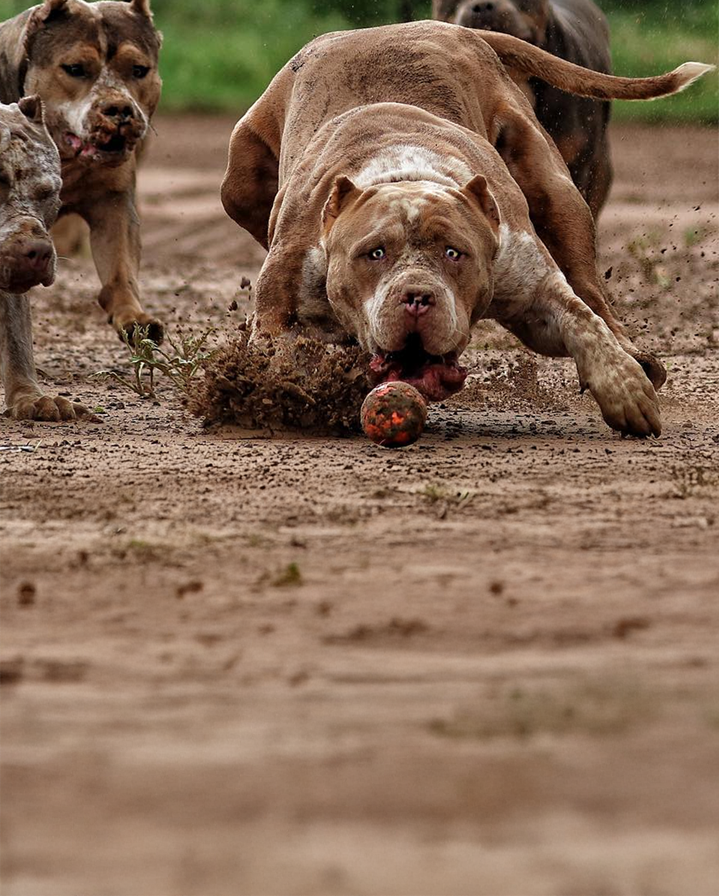
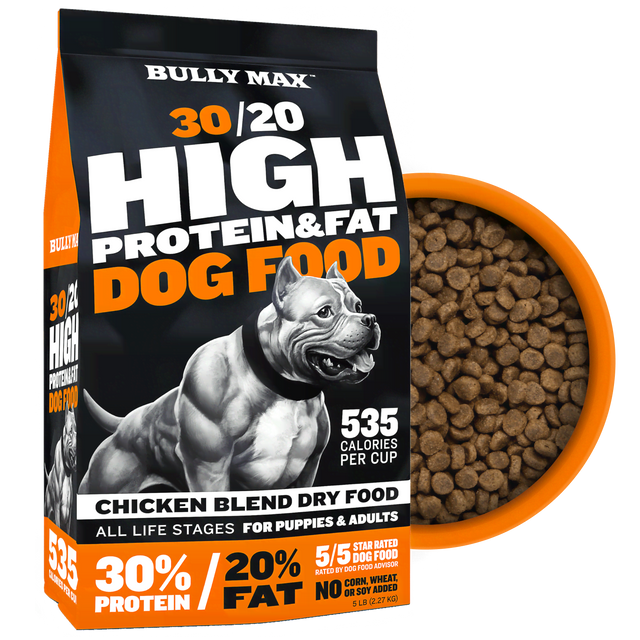
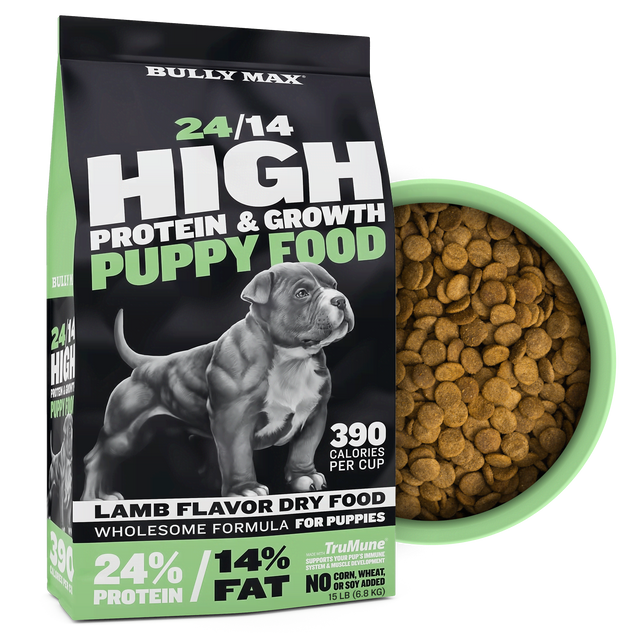
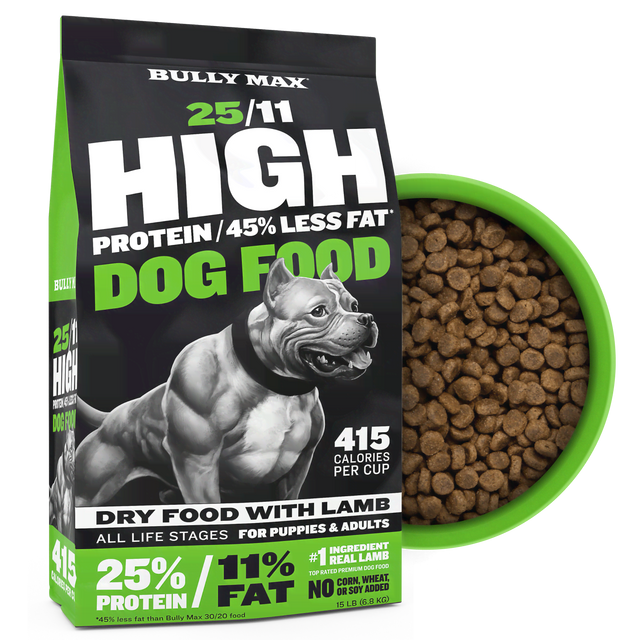
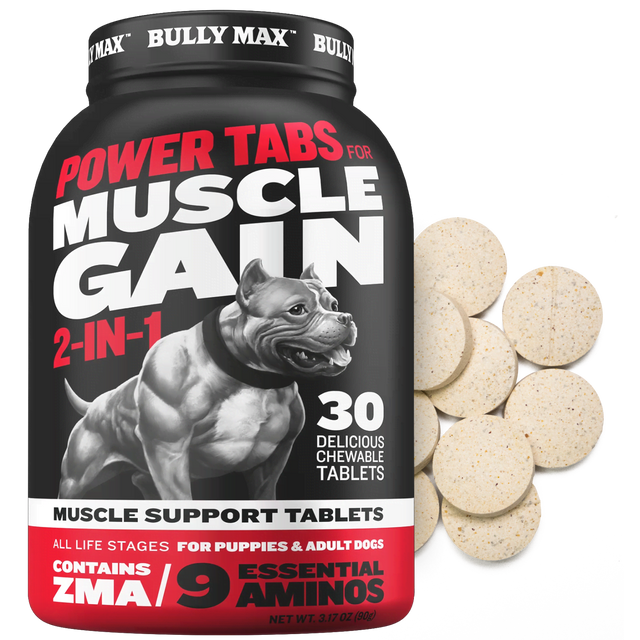




3 comments
Best food for our pet Smokey who has a sensitive stomach ? What’s better beef or chicken or salmon ?
What can I use for my 16 week old American bully for diarrhea
Thank you for sharing! Very helpful. My 13 year Blue heeler/bDexter been really fighting some stomach problems before. baby. Cooking some white rice and chicken now.